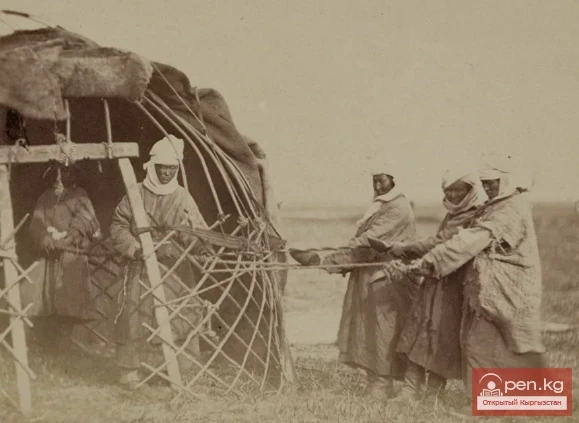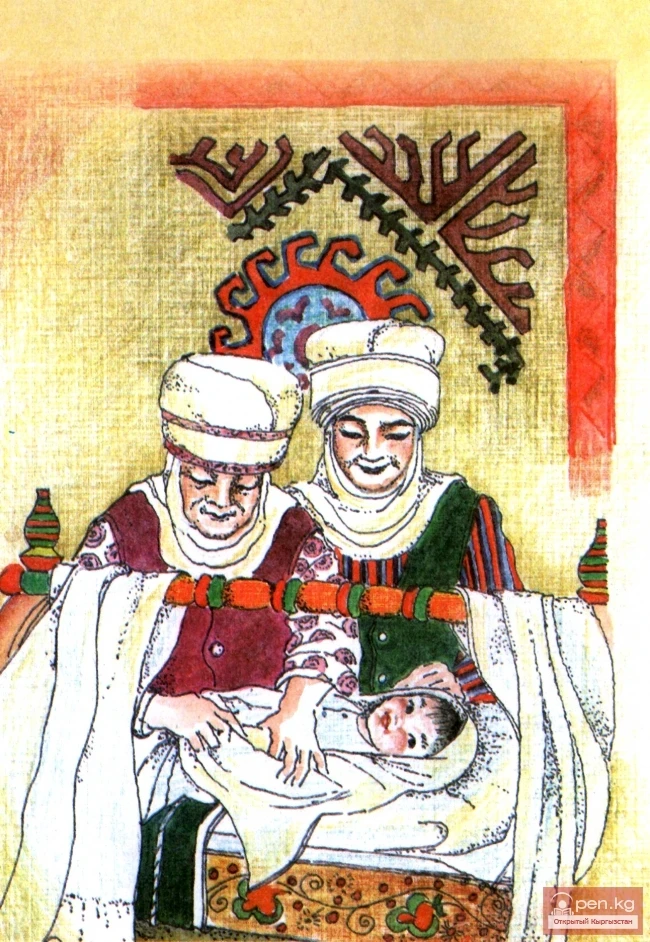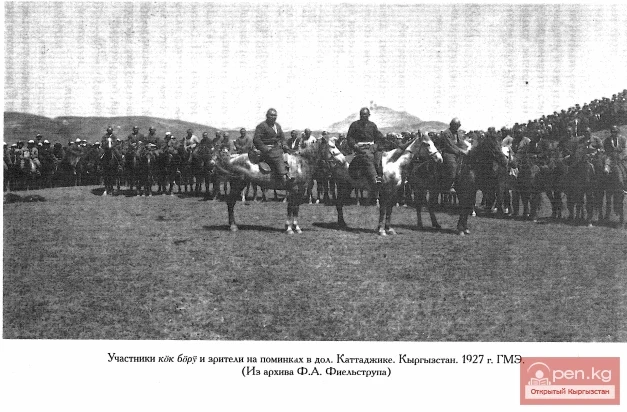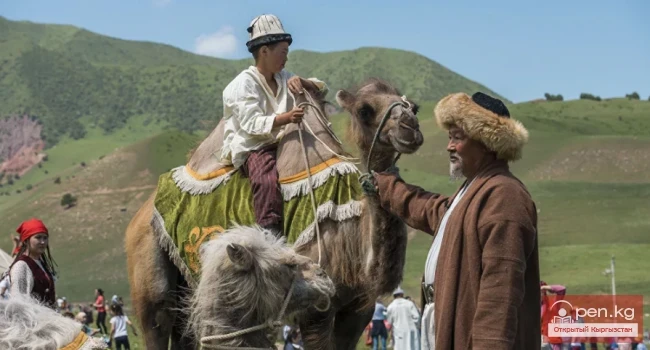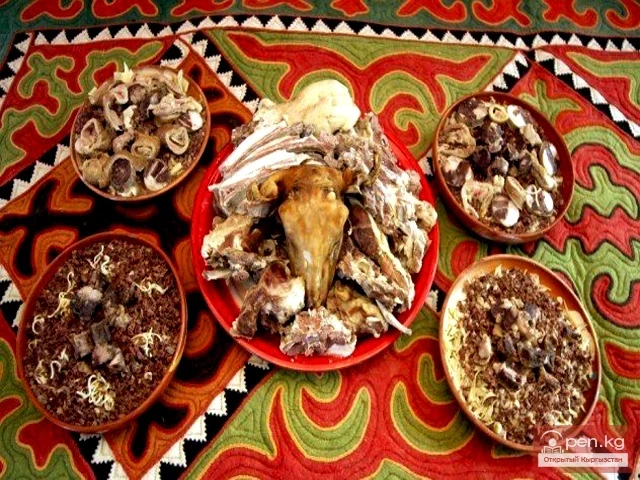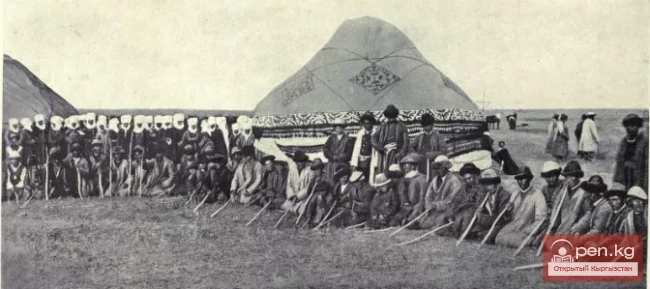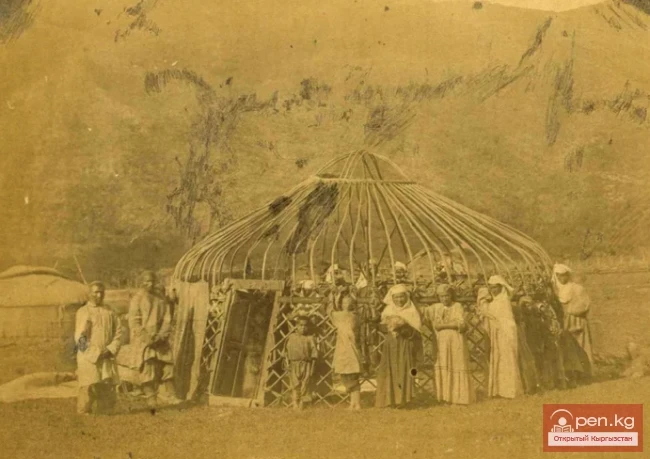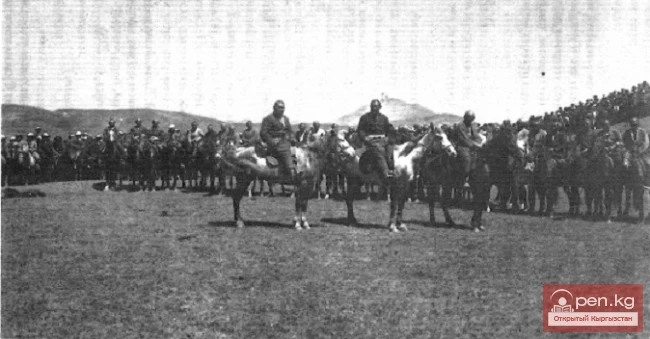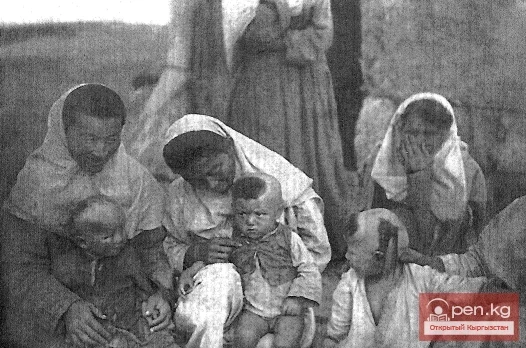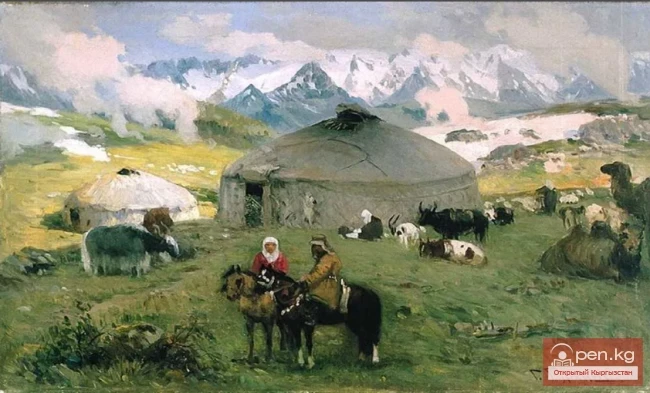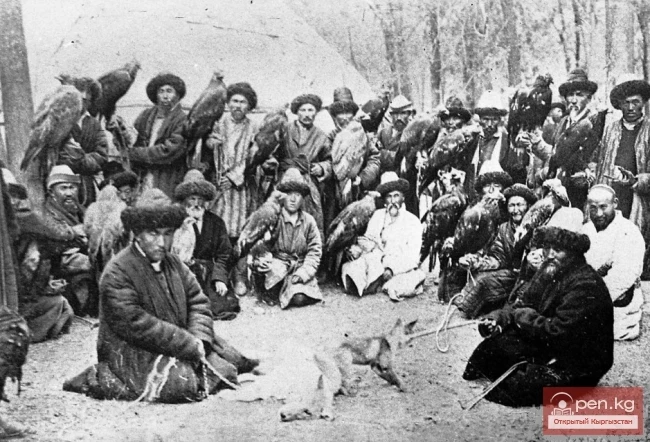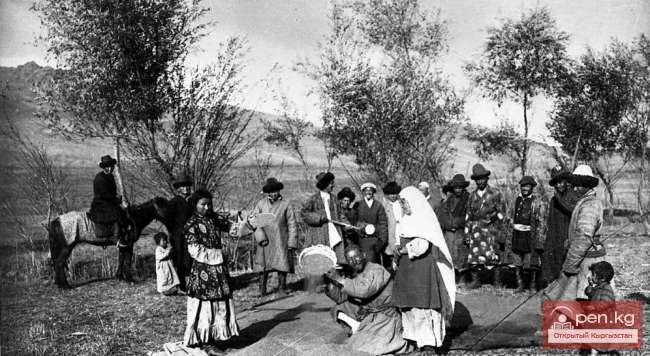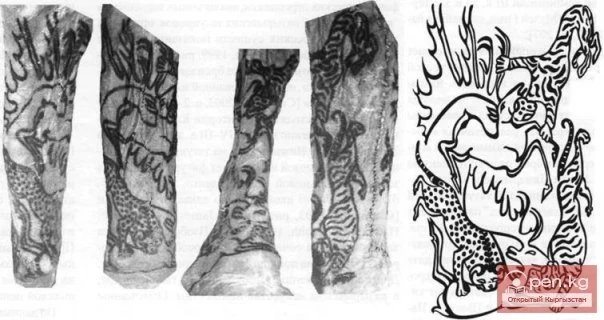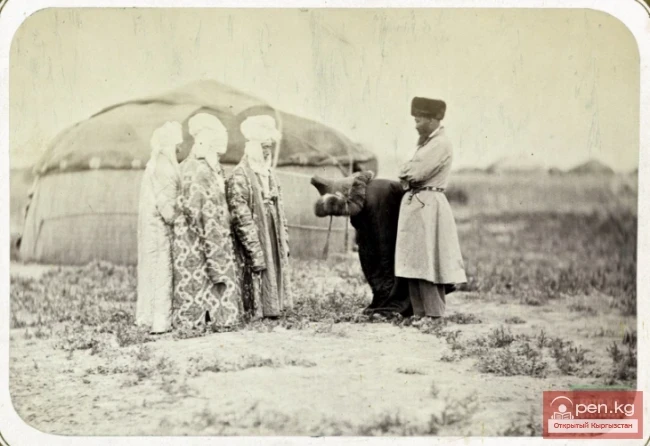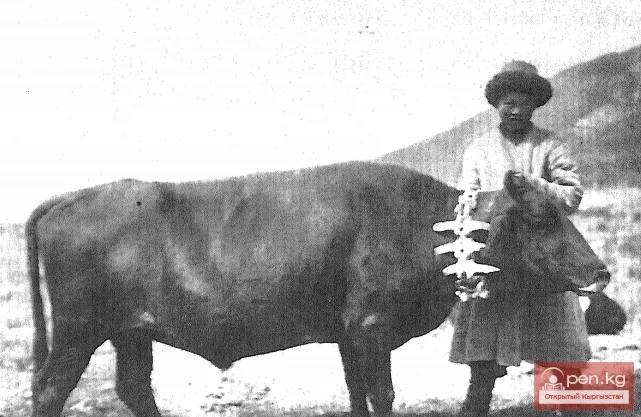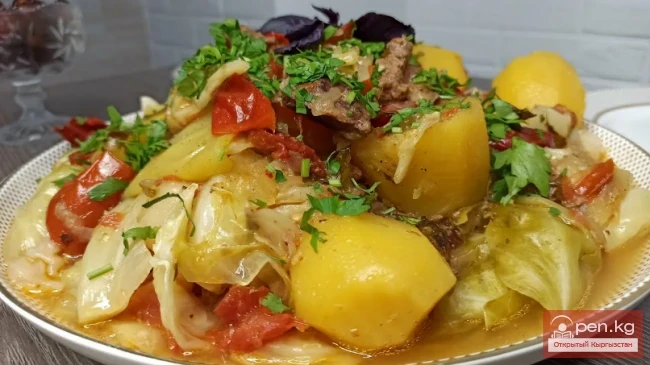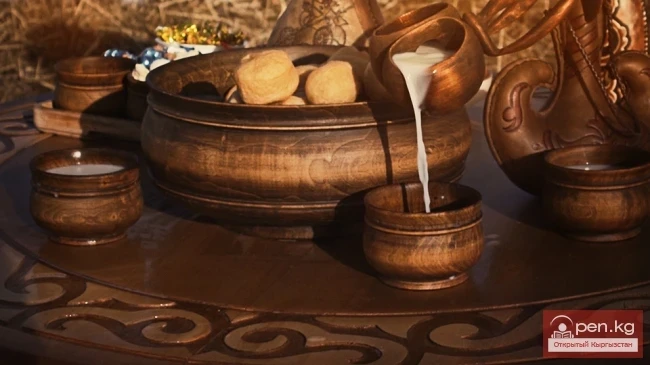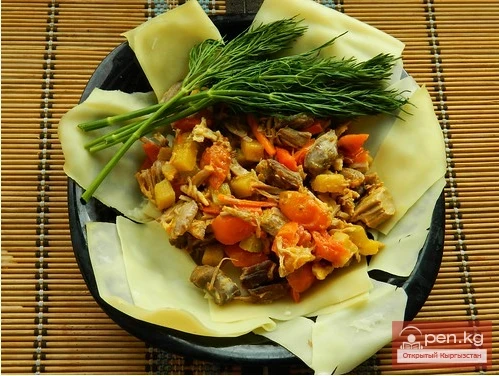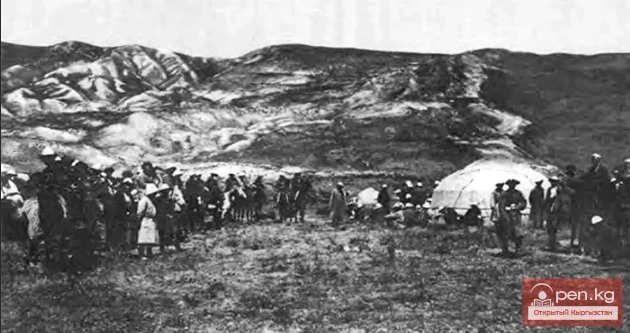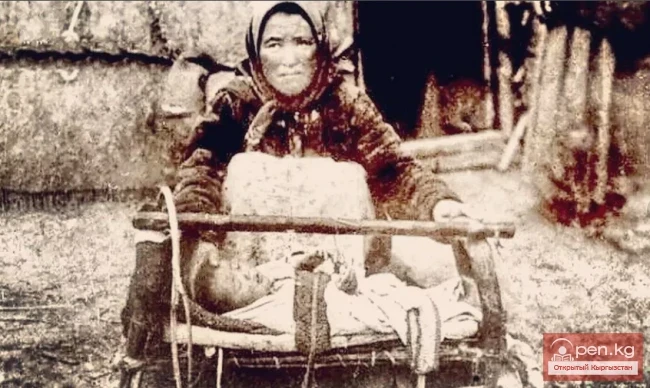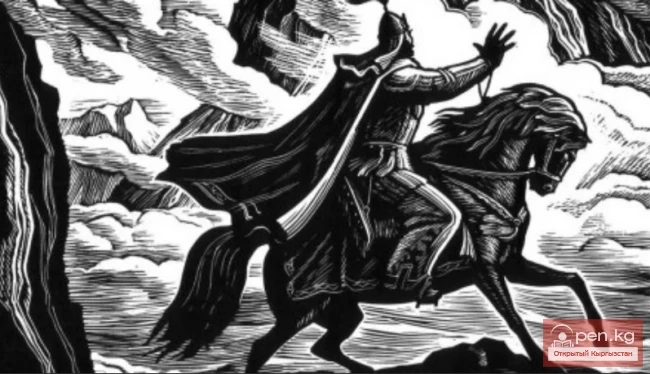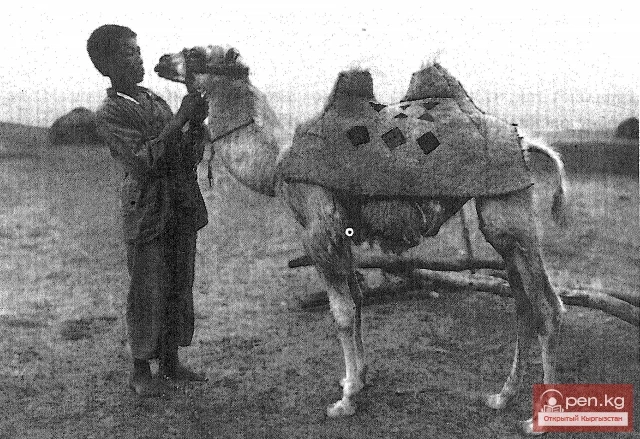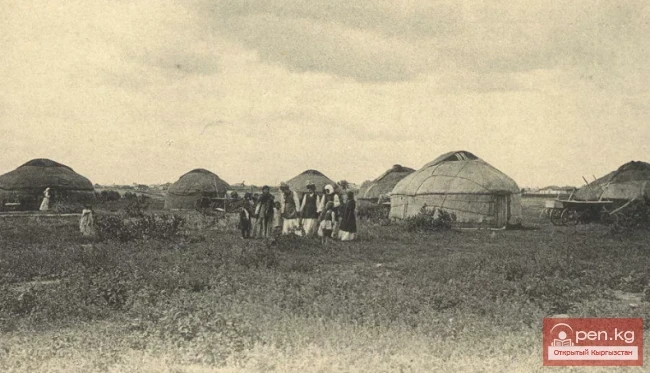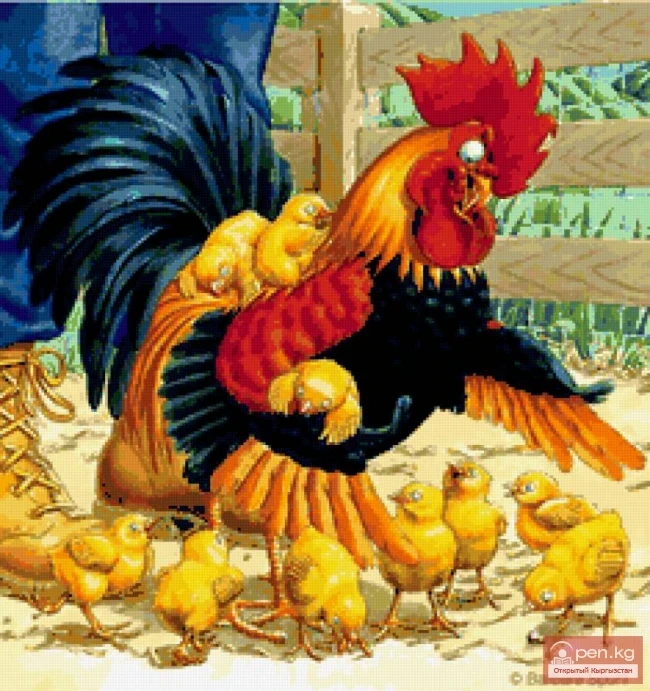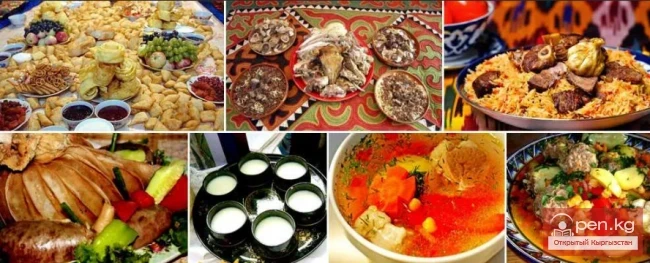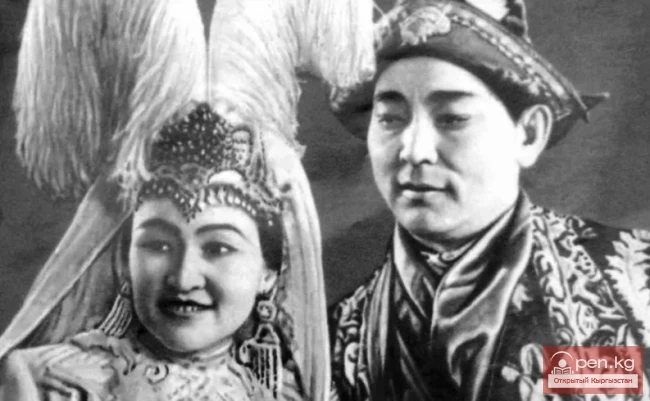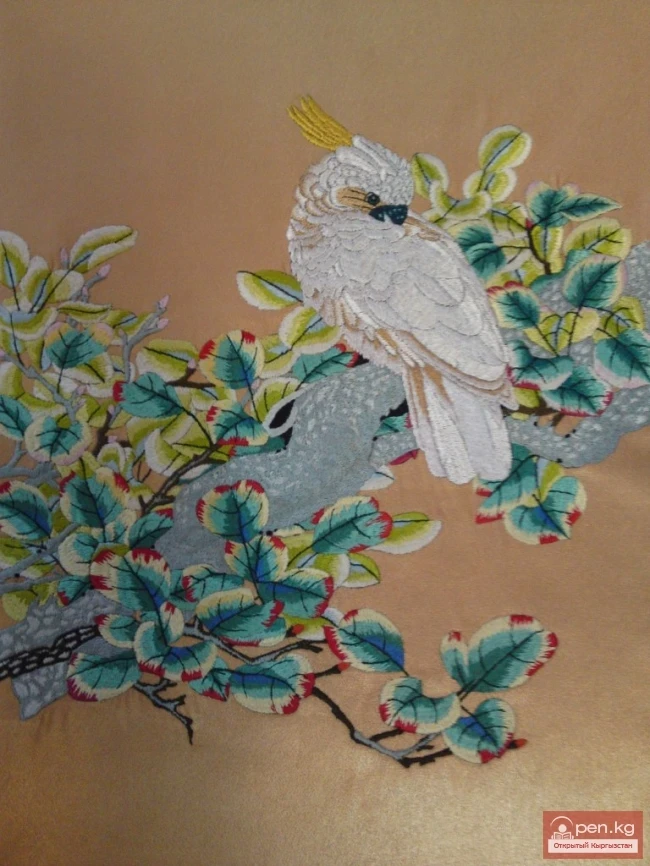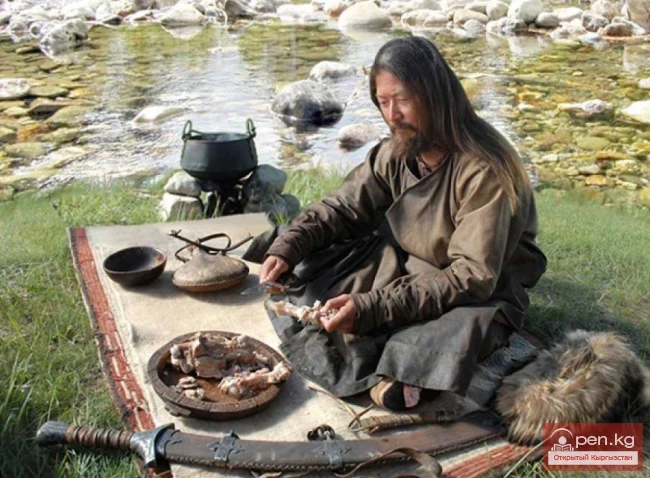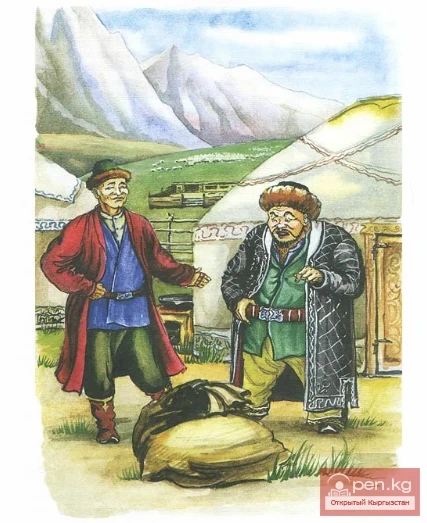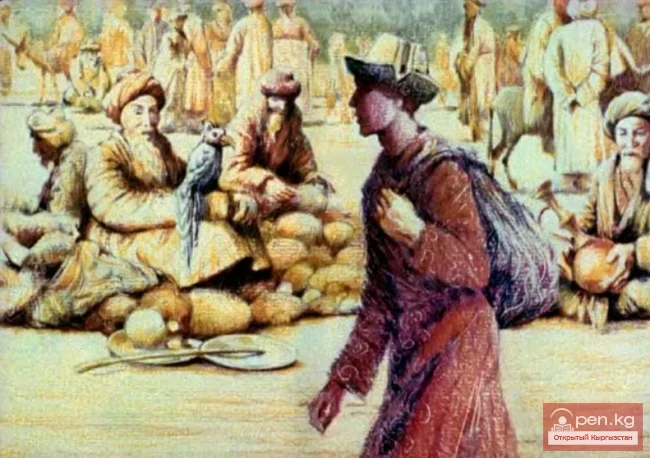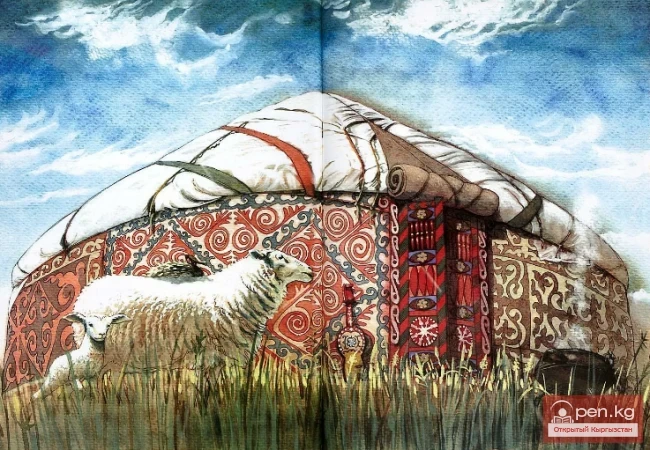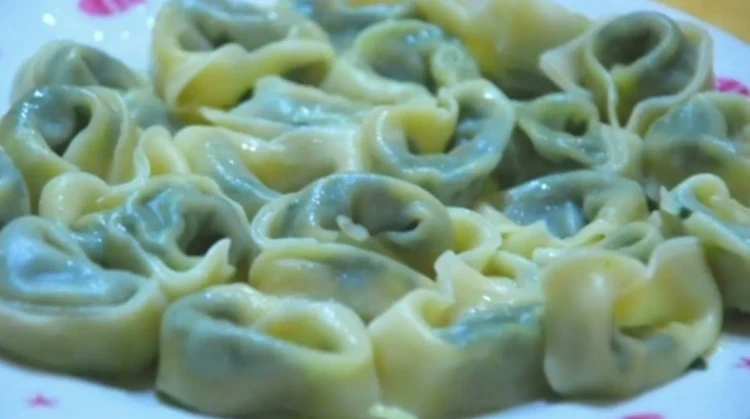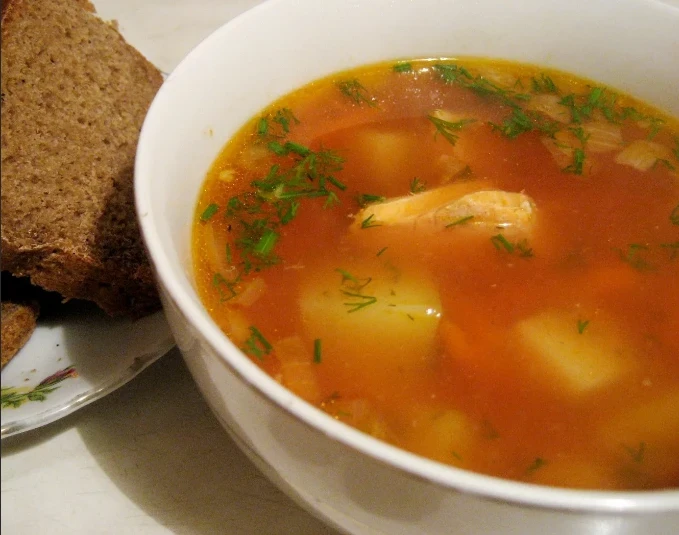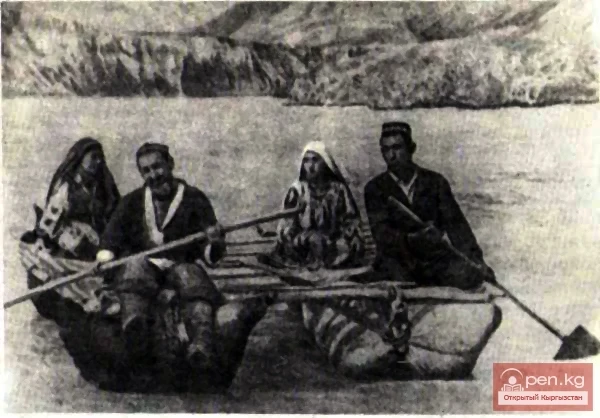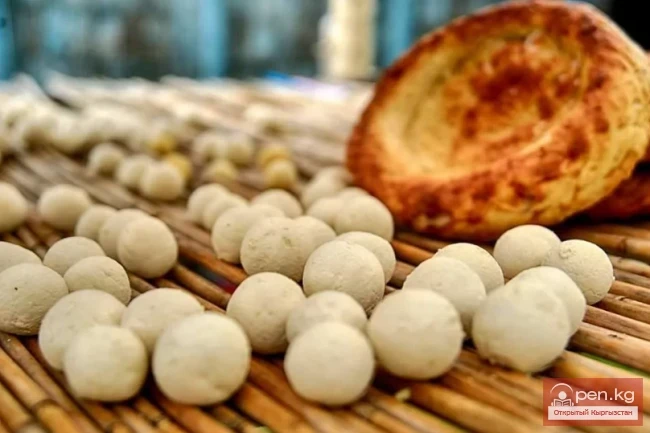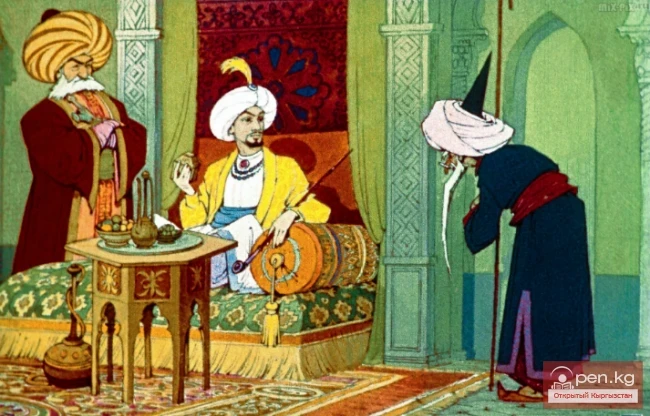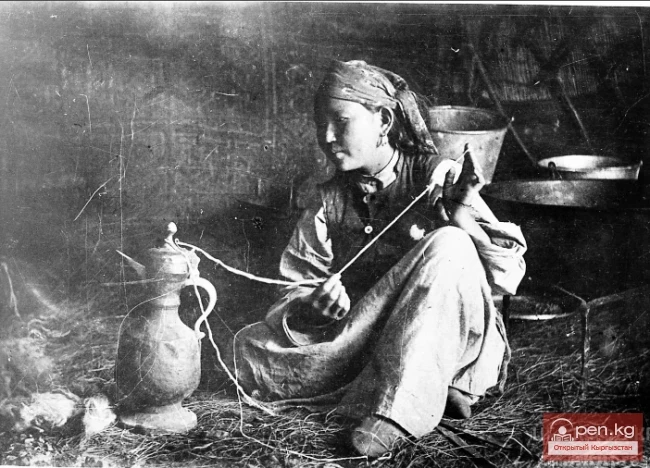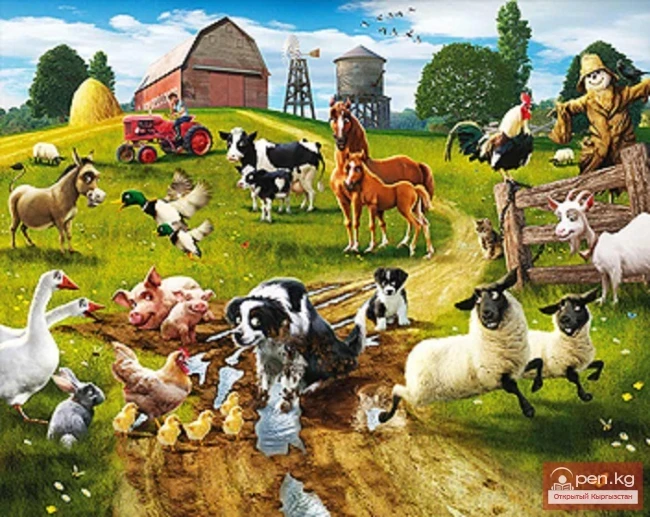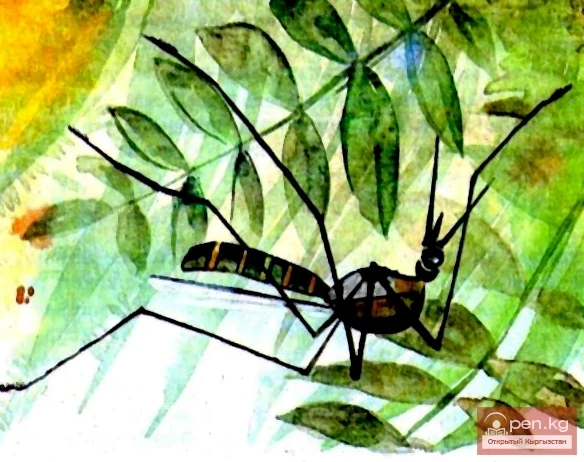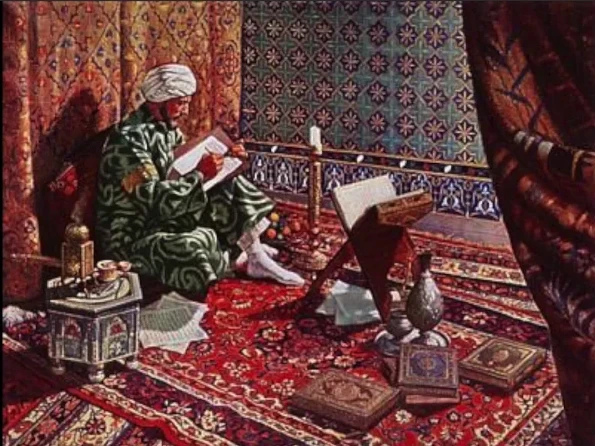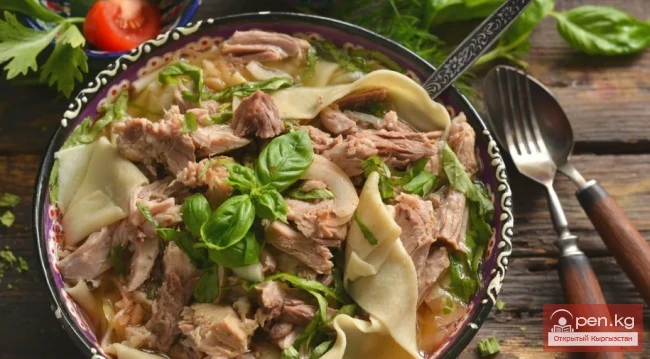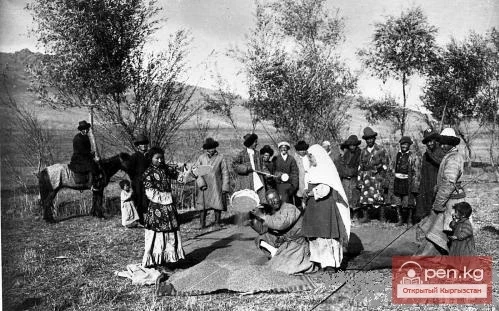
SACRIFICES, CELEBRATIONS, MAGICAL ACTIONS
r.ch. Big Kebin
Tulëö — a sacrifice, for example, a prayer for rain during a drought. Livestock is slaughtered after reciting a prayer (in Arabic) and asking for rain. Then the cooked meat is divided and eaten, leaving nothing for God.
Jer-Suu taiy1 — an annual sacrifice before moving to the summer pastures. One livestock is sacrificed from each yurt, or several people contribute together. They gather in the green steppe by the water. The livestock must be without blemish, if possible; its color is indifferent. The prayer is led by a mullah. They dig pits for the cauldrons — kemege, in which they cook the meat. Instead of a mullah, an elder who knows the ceremony may lead. The youth play while the meat is cooking.
During the celebration, wrestling, singing, and other activities are organized.
One person remembers: his mother used to cook porridge in a cauldron, then splashed one spoon into the fire, another into the changarak2, and the rest they drank themselves — for a good life, health, etc. There was no special prayer; only the usual form of bata was recited.
When in spring the foals grow enough to do without their mother's milk, and people start making kumys, they set up a jelly, go there with kaymak (fresh cream), bread, and invite the elders, who, pouring ayran into a cup, splash it onto the jelly3. Then everyone present eats the bread, kaymak, and prays for a good offspring in the herds. After this, the foals are brought in, tied to the jelly, and milking begins. For the first two days, kumys is not drunk to ensure there is plenty; then, in the morning, neighbors are invited, who sit in a circle in the yurt, spread a tablecloth, and pour kumys into all cups for everyone to drink at the same time. The guests pray, wishing the hosts plenty of kumys, drink, and then go home.
After Jer-Suu taiy, they immediately move to the new pastures.
Uluş — a feast is prepared by the wealthy, after which it is not necessary to leave the place immediately.
When building a new house or yurt, livestock is slaughtered, guests are treated, and only after that do they settle in; the same applies to orgë. The fire in the new dwelling is lit in the usual way.
Turkmen-sayak
During uluş, kumys is splashed on the jelly.
Chinavay
Tulo — a sacrifice made in four cases: after an earthquake, to prevent it from happening again; during an epidemic, during a drought (asking for rain); a thank-offering after the danger has passed. Sadaka — a sacrifice due to the illness of a family member: an elder aksakal is invited, or the father himself recites bata and slaughters a lamb. The meat is shared with the guests.
Upko chapt4 — if a family member returns home sick after leaving healthy, without inviting the newcomer into the yurt, the relatives slaughter a kid and, without removing its skin, take out the lungs, hitting the sick person on the head, shoulders, sides, and thighs with them. Then they throw the lungs away somewhere, and give the kid to a neighbor, not eating it themselves (see: "Healing").
To ensure that a son returning from a long trip does not bring impurity into the house, his mother meets him and, pouring a cup of water, circles it three times around his head, makes him spit into it, and then pours out the contents of the cup.
At the first thunder, women take a bucket or konok, hit it with a ladle, and walk around the yurt — dambr tagi5; this marks the beginning of summer.
Uluş — a holiday of mares, a kumys festival, is held in groups, sometimes quite large. Those who do not have kumys do not hold uluş. Pouring kumys into the pits left by the pegs6 is a Kalmyk (pagan? — F.F.) custom.
This practice ceased after liberation from the Kalmyk yoke. Before uluş, kumys is collected for a long time. After the feast, the mullah recites some Arabic prayer, and then, when he raises his hands, the attendees silently add wishes for the well-being of the mares, etc., without a specific established formula, addressing God in Kyrgyz. Then there is wrestling, competitions, games (kökbörü and others — borrowed from Uzbeks? — F.F.).
Usually, uluş is held in the months of bash or ayak-ona7. The time is determined by convenience, when people are closely grouped, and close relatives are together.
Jer-Suu taiy is held every year, at any time of the year, even in winter, especially in summer, in case of drought. Everyone brings a sacrificial animal (livestock) according to their means, and each sacrificer cooks meat in their own cauldron, which is then collected into one common cauldron and distributed by groups, regardless of the person's origin. Jer-Suu taiy is also held after an earthquake, when the presence of a mullah is necessary. In other cases, when it is an ordinary annual holiday, it can be done without a mullah, and any person can recite any prayer. After the Muslim prayers, the attendees individually address God (Kudaï), aruakham, asking for well-being.
During uluş, a ram is slaughtered.
Jer-Suu taiy is held in case of disaster — only an Arabic prayer in Kyrgyz, without a special formula, is recited by one of the attendees, an honored person; a mullah is not required here.
Bozbashtyk
Jer-Suu taiy is necessarily held annually, but at different times, arbitrarily appointed depending on convenience. A prayer on behalf of all is recited by some elder, not a mullah. Taiy — a sacrifice, but only for the current occasion.
During uluş, kumys is splashed on the jelly and poured into the pits left by its pegs. After this, they immediately move to a new location.
Uluş is held by a whole group of relatives — 50–100 yurts. They slaughter a mare, accumulate kumys for three days, then invite each other and treat one another. If many auls unite, they discuss how to do it and split into two groups; thus, everything ends in two days. They invite several people into the yurt, which is nicely decorated, give gifts to the elders (chapan, horses), and organize wrestling, baigü, kökbörü. First, there are entertainments, then a feast (kökbörü was borrowed by the Kyrgyz from the Sart, and from the Kyrgyz, it passed to the Kazakhs).
Splashing kumys on the jelly, etc. — a pagan custom.
Uluş was held in July, by agreement (now usually on Friday). This is a holiday of sacrifice in favor of all — people and livestock.
The formula recited during various sacrifices at the moment of slaughtering the animal:
Jalymmak mendan. Ask from me.
Jalkamak sendan. Blessing from you.
Erşe aityq, kech kaldyk. We wanted to ask earlier, but we ask later.
Apukul kecher, Allah Akbar. Forgive us, Allah the Great.
It is recited by the one who slaughters, while others hold their hands in front of themselves (? — F.F.), as in prayer. A young man slaughters and says three times: "Bismillah rahim"8, — and so on. This concludes the celebration.
Jer-Suu taiy is performed at any time, even in winter. The entire population of a known small area gathers at a convenient place, bringing livestock for slaughter, bringing bread, etc. Someone prays. The formula for the request is the same as for uluş.
r.ch. Big Kebin
In summer, two- or three-year-old fillies (bay-tal) are separated from their mothers, nine for one stallion. A stallion is brought in. Tying a piece of cotton wool to its forehead9, it is positioned facing west. An elder is invited, a cup of ayran is poured, a lamb is taken for this occasion, and prayers are offered to God for many fillies. Then the stallion's forehead is smeared with ayran, and the remainder from the cup is drunk. The lamb is left with the жылкычи (herdsman), who will slaughter it for himself in the autumn. The bridle is removed from the stallion, and it is released among the fillies.
Talas
kainazar
Jer-Suu taiy, kudaiy. In case of drought, the community goes to the riverbank and brings a sacrifice — a calf, for example, or a cow. The entire population of the aul goes to the place of sacrifice. This happens in spring. The animal is bought from someone for wheat or something else. The livestock is slaughtered in the usual manner, and the meat is cooked at the place of sacrifice. The remains are treated as usual. During the offering, they ask God for rain.
Alamedin
solto-bolokbay
Jer-Suu taiy is performed in case of drought.
Satyvaldy
buku
Jer-Suu taiy is performed in case of an epidemic or drought. The prayer: "Ivara kudaiye malımdı amantıl, janındı amantıl, oru сыркодон amantıl. Karapturgan okuмottо jatasyң! Ivara!"10
The kin here does not play a role. The sacrifice is made somewhere by the water, they feast from a common cauldron, treating everyone who comes. The livestock is slaughtered as usual, and the blood is not collected.
Talas
Cholpankulov
kainazar
Uluş — is held once a year. All the population of the aul participates. It lasts two to three days.
There is a mutual alternating feast of two clans. They feast from morning till evening. There are no games. Guests are distributed among the auls.
Alamedin
solto-bolokbay
Uluş — a simple feast.
Talas
Cholpankulov
kainazar
Kiiс той11 — in autumn, when after shearing the sheep, the wool is rolled into felt. Women who were invited to help are treated, a lamb is slaughtered, etc.
Sarybulak
buku
Uluş is held once a year, usually in the month of buku12. Its scale varies: in a wealthy aul, the aul treats, in a poor one — the tent treats the tent. A person with a mare and other livestock accumulates kumys for this occasion for three to four days and slaughters one lamb. They perform bata.
After uluş, there is no need to move.
Sarybulak
Satyvaldy
buku
Uluş is held in hot weather, and one district invites another to a feast, mutually. All hosts slaughter what they can. During the feast, they first drink kumys, then entertain themselves with races, games, and then feast on meat.
Elder guests are distributed among the richer tents, where mares were slaughtered, while the youth are placed in other, poorer ones.
After the feast, they pray for the next year to have another uluş. The same happens during the reciprocal feast. After uluş, there is no mandatory moving.
Kydyr
Uluş-toy — held once a year, in mid-summer, a mare is slaughtered, and invited guests are treated. When the guests leave, the hosts pack up: they dismantle the tents, load all the belongings, and, ready to move, the last thing they do is pour kumys into all the pits left by the pegs of the jelly, cover them with earth, stick in sticks, and thus leave the place, saying the usual: "Allah Akbar".
Talas
Cholpankulov
kainazar
Oruluk. The aul that arrives at the pasture earlier must treat the aul that arrives after it. After slaughtering livestock and cooking meat (or just a live lamb), they send it to the newcomers. This custom is practiced both among relatives and among neighbors in the territory.
Treating neighbors once during the summer is a mandatory custom.
Talas, Chon Koshoy
Janizak
solto
Oruluk is sent if the arriving aul is small (one or two tents), but if it is large, they invite everyone to themselves.
Satyvaldy
buku
It is customary to treat the newly arrived neighbor at home, with whatever the host can offer.
Comments:
1 Jer-Suu taiy — to bring a sacrifice to the deity Earth-Water (Yudakhin K.K. Uká. works. p. 690).
2 Splashing a spoonful of broth into the fire and chimney, i.e., bringing a sacrifice to the home hearth (See the section "Wedding rituals among the Kyrgyz", note 43).
3 See the section "Animal husbandry".
4 Opkё chop — literally, "beating with lungs", a method of treatment in folk medicine (See the section "Healing").
5 See note 3 in the section "Other customs".
6 See the section "Animal husbandry".
7 Corresponds to July and August (see the section "Calendar and Astronomy").
8 Bismillah ir-Rahman ir-Rahim — "In the name of Allah, the Most Gracious, the Most Merciful!" Usually, any important matter among Muslims begins with these words.
9 See the section "Animal husbandry".
10 The prayer: "Omnipresent God! Preserve my livestock! Protect from diseases! Let the one present here be healthy. Omnipresent!"
11 Kiis toy (kiyiz toy) — a celebration, a feast in honor of the completion of felt rolling.
12 Corresponds to April (see the section "Calendar and Astronomy").
Healing. Rituals related to the social life of the Kyrgyz in the early 20th century

